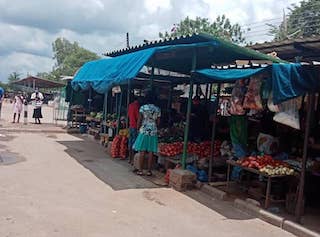By Tinashe Mungazi
Some informal traders in Hwange continue to defy lockdown measures imposed by the government, as they continue with their business amid a surge in Covid-19 cases in the country.
As of January 11, 2021, Zimbabwe has recorded 22 297 cases and 528 deaths.
As the country entered the 9th day of lockdown, one would be forgiven for thinking that the country was back to normal due to the hive of activity in the mining town.
Last week patrolling police officers who were enforcing lockdown regulations reportedly ordered the closure of the stalls selling various items from vegetables to cooking oil and arrested violators especially those not properly wearing masks.
The vendors, however, ignored the directives and returned to their stations immediately after the police officers left. CITE observed that over the weekend the markets and shops were left to operate unhindered.
Shops selling and repairing cellphones, groceries and other items such as clothes also remained opened over the past days with some taking advantage of the lax enforcement to remain operational.
The vendors told CITE that the tightening of the measures were economically damaging in the absence of safety nets or a financial rescue package for the informal sector.
“We understand the need for the lockdown in trying to contain the number of infections but these measures are harsh on us as we solely survive through selling our wares. Shutting us down for a month without any form of financial backup or assistance from government will have detrimental effects on us. Remember this is our only form of livelihood, we survive and fend for our families through selling vegetables and different products you see here including paying rentals,” said one vendor who refused to be named.
Another vendor called on the government to reconsider the restrictions on the informal sector arguing that the measures spelt doom to their economic survival.
“Government should reconsider its position with regards to us in the informal sector especially the suspension of our operations. Let’s not forget that we are still trying to pick up the pieces following a gruelling 8-month long national lockdown that had serious implications on the economy both nationally and at a household level,” said one Ndlovu.
Under the measures announced by Vice President Constantino Chiwenga who doubles as Health and Child Care minister, most commercial and informal sectors will be closed for a duration of 30 days save for supermarkets, pharmacies and hospitals amongst other services classified as essential.
The productive sectors which include agriculture, mining and manufacturing will also be allowed to remain operational during the restrictive period.
Other measures included the banning of church services and weddings while funeral gatherings were restricted to 30 people. Bottle stores, bars, gymnasiums and restaurants were also suspended.

